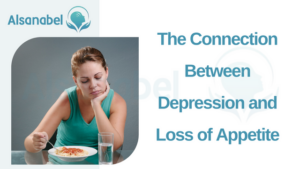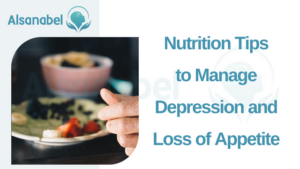Depression and Loss of Appetite: Signs and Symptoms 2023
- Category ADHD
Depression and Loss of Appetite
Depression is a mental health disorder that affects millions of people worldwide. It can be caused by a combination of various factors, including biological, psychological, and environmental factors. When someone is dealing with depression, they often experience a loss of interest or pleasure in activities, which can also extend to a loss of appetite.
There are different reasons why depression and loss of appetite often go hand in hand. For some individuals, it may be a direct symptom of their depression, as the chemical imbalances in their brain can affect their appetite regulation. Others may lack the motivation or energy to prepare and eat meals due to their low mood. Additionally, depression can intensify feelings of sadness, which can suppress the appetite further.
Symptoms and Effects of Depression and Loss of Appetite
Depression can manifest in a variety of ways, and the loss of appetite is just one symptom that individuals may experience. Some other common symptoms of depression include persistent sadness, feelings of hopelessness, difficulty concentrating, decreased energy levels, and changes in sleep patterns.
The effects of depression and loss of appetite can be both physical and emotional. Physically, a lack of proper nutrition can lead to weight loss, weakened immune system, and nutrient deficiencies. Emotionally, individuals may feel even more isolated and discouraged due to the inability to derive pleasure from eating.
It is important to note that depression and loss of appetite can vary in intensity and duration for each individual. If you or someone you know is experiencing these symptoms, seeking professional help from a mental health expert can provide valuable support and guidance in managing depression and improving appetite.
The Connection Between Depression and Loss of Appetite

How depression affects your appetite
Depression is a complex mental health disorder that can have a significant impact on various aspects of a person’s life, including their appetite. When someone is going through depression, they often experience a loss of interest or pleasure in activities, and this extends to a loss of appetite as well.
The causes of this connection can be multifaceted. For some individuals, the chemical imbalances in their brain that are associated with depression can directly affect their appetite regulation. These imbalances disrupt the normal functioning of neurotransmitters that are responsible for signaling hunger and satiety, leading to a decreased desire to eat.
Additionally, depression can affect a person’s motivation and energy levels. In many cases, individuals may lack the drive to prepare and eat meals due to their low mood. The act of eating may feel like a burden, and they may have a decreased interest in food altogether.
The impact of lack of appetite on mental health
The loss of appetite that often accompanies depression can have significant implications for a person’s mental health. Proper nutrition is essential for overall well-being, and when individuals do not consume enough nutrients, it can further exacerbate their depressive symptoms.
Physically, the lack of proper nutrition due to a decrease in appetite can result in weight loss, weakened immune system, and nutrient deficiencies. These physical effects can leave individuals feeling even more fatigued and depleted, making it harder for them to combat their depression.
Emotionally, the inability to derive pleasure from eating can contribute to feelings of isolation and discouragement. Food is often associated with enjoyment and social connection, so the loss of appetite can further intensify the sense of loneliness and disconnection that comes with depression.
It is important to recognize that depression and loss of appetite can vary in intensity and duration for each individual. Seeking professional help from a mental health expert is crucial in managing depression and improving appetite. Remember, reaching out for help is not a sign of weakness, but rather a proactive step towards better mental well-being.
Understanding Borderline Personality Disorder 2023
Coping Strategies for Depression and Loss of Appetite
Seeking professional help and therapy options
When facing depression and loss of appetite, it’s crucial to reach out for professional help. Consulting a mental health expert can provide valuable guidance and support in managing these challenges. Therapists can help individuals understand the root causes of their depression and develop coping strategies specific to their situation.
There are various therapy options that can be beneficial for addressing depression and loss of appetite. Cognitive-behavioral therapy (CBT) is a common approach that focuses on identifying and changing negative thought patterns. It can help individuals reframe their thoughts about food and improve their relationship with eating. Other therapy options, such as interpersonal therapy (IPT) and psychodynamic therapy, may also be helpful in addressing underlying emotional factors that contribute to depression and loss of appetite.
Self-care practices to improve appetite and mental well-being
In addition to seeking professional help, implementing self-care practices can have a positive impact on appetite and overall mental well-being. Here are some strategies to consider:
- Establish a routine: Creating a structured daily routine can provide a sense of stability and predictability, which can be beneficial for managing depression and maintaining regular eating habits.
- Engage in enjoyable activities: Encouraging oneself to participate in activities that bring joy and pleasure can help counteract the lack of interest caused by depression. Engaging in hobbies, spending time with loved ones, or pursuing creative outlets can boost mood and potentially increase appetite.
- Practice mindful eating: Paying attention to the sensory experience of eating can enhance the enjoyment of meals. Engage all the senses while eating, savor each bite, and try to be present in the moment. Mindful eating techniques can help improve the appetite and create a more positive relationship with food.
- Exercise regularly: Engaging in physical activity releases endorphins, which can improve mood and appetite. Regular exercise can also enhance overall well-being and contribute to a healthier appetite.
- Get enough sleep: Adequate sleep plays a vital role in mental health and appetite regulation. Establishing a regular sleep schedule and creating a relaxing bedtime routine can support better sleep quality.
Remember, everyone’s journey with depression and loss of appetite is unique. What works for one person may not work for another. Listening to one’s body, practicing self-compassion, and seeking professional support are key steps in managing these challenges and improving mental well-being.
Nutrition Tips to Manage Depression and Loss of Appetite

Choosing nutrient-dense foods to stimulate appetite
When faced with depression and loss of appetite, it’s important to prioritize nutrient-dense foods that can help stimulate your appetite and support your overall well-being. Opting for foods that are rich in vitamins, minerals, and antioxidants can provide your body with the necessary nutrients and energy it needs.
Some examples of nutrient-dense foods include:
- Leafy green vegetables: Spinach, kale, and Swiss chard are packed with essential vitamins and minerals that can help boost your mood and increase your appetite.
- Protein-rich foods: Incorporating lean sources of protein like chicken, fish, tofu, and beans can help support healthy muscle function and promote feelings of fullness.
- Whole grains: Choose whole grain options like brown rice, quinoa, and whole wheat bread, which can provide a steady release of energy and help improve your overall mood.
- Healthy fats: Including foods like avocados, nuts, and seeds can provide essential fatty acids that contribute to brain health and help improve your mood.
Creating a healthy and balanced meal plan
Developing a meal plan that focuses on balanced nutrition can be beneficial when managing depression and loss of appetite. Here are some tips to consider:
- Plan regular meals and snacks: Eating regularly throughout the day can help maintain stable blood sugar levels and provide a consistent source of energy.
- Include a variety of food groups: Ensure that your meals contain a balance of carbohydrates, proteins, and healthy fats to support overall nutrition.
- Incorporate small, frequent meals: If eating large portions feels overwhelming, try breaking your meals into smaller, more manageable portions throughout the day.
- Experiment with different cooking methods: Trying different cooking methods, such as roasting, steaming, or grilling, can help add variety to your meals and make them more appealing.
Remember, it’s important to consult with a healthcare professional or a registered dietitian who can provide personalized advice tailored to your specific needs. Nutrition plays a crucial role in managing and improving mental well-being, and making small changes in your diet can have a positive impact on your overall health and appetite.
Lifestyle Changes to Combat Depression and Loss of Appetite
Incorporating exercise into your routine
Regular exercise is known to have numerous benefits for mental health, including reducing symptoms of depression and improving overall well-being. When dealing with depression and loss of appetite, incorporating exercise into your daily routine can be especially helpful. Engaging in physical activity releases endorphins, which are known as “feel-good” hormones. These endorphins can help boost your mood, increase energy levels, and improve your appetite.
Find an exercise that you enjoy, whether it’s going for a run, practicing yoga, or joining a dance class. Aim for at least 30 minutes of moderate-intensity exercise most days of the week. Start with smaller goals and gradually increase the duration and intensity as you build up your stamina. Remember, even a short walk or a gentle stretching routine can make a difference.
Developing a supportive social network
Building a strong support system is crucial when managing depression and loss of appetite. Surrounding yourself with friends, family, or support groups can provide comfort, encouragement, and understanding during difficult times. Sharing your struggles and emotions with trusted individuals can alleviate feelings of isolation and provide a sense of belonging.
Seek out communities or organizations that cater to individuals facing similar challenges. Online forums or local support groups can offer a safe space for sharing experiences, exchanging tips, and finding solidarity. Additionally, friends and family members can play an instrumental role in providing companionship, offering help with meal planning and preparation, and ensuring that you’re getting the support you need.
Remember, it’s essential to communicate your needs and be open to receiving support. By developing a supportive social network, you can create a sense of community and find comfort in knowing that you’re not alone in your journey.
Incorporating exercise into your routine and developing a supportive social network are vital lifestyle changes that can help combat depression and loss of appetite. By taking proactive steps to prioritize your mental and physical well-being, you can work towards improving your overall health and regaining your appetite.
Seeking help for depression and loss of appetite
It is important to note that depression and loss of appetite can be complex and challenging issues that may require professional support. If you or someone you know is experiencing persistent feelings of sadness, hopelessness, or a loss of interest in activities, it is crucial to seek help from a mental health professional. They can provide a proper diagnosis, offer guidance, and develop a personalized treatment plan to address these concerns.

In addition to professional help, reaching out to trusted friends and family members for emotional support can make a significant difference in managing these challenges. Sharing your feelings and experiences with someone you trust can provide solace and help lighten the burden.
Taking steps towards recovery and well-being.
Recovery from depression and loss of appetite is a journey that requires dedication and patience. Here are some steps you can take to support your well-being:
- Prioritize self-care: Make self-care a priority and engage in activities that bring you joy and relaxation. This could include hobbies, spending time in nature, or practicing mindfulness and meditation.
- Explore therapy options: Consider therapy options such as cognitive-behavioral therapy (CBT) or interpersonal therapy (IPT). These therapies can help you understand and manage your emotions, build coping mechanisms, and develop healthier thought patterns.
- Maintain a balanced diet: Focus on consuming nutrient-rich foods that nourish your body and support your overall well-being. Consult a healthcare professional for guidance on nutrition and meal planning.
- Stay active: Continue incorporating regular exercise into your routine, as physical activity has been shown to positively impact mood and overall mental health.
Remember, recovery takes time, and it’s okay to seek support along the way. With the right help, lifestyle changes, and a strong support network, you can overcome depression and regain your appetite, ultimately improving your overall









